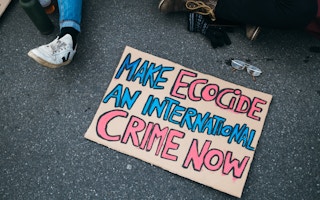Where is ecocide already a crime?
Ecocide is a crime in 11 countries including Armenia, Belarus, Kazakhstan, Russia and Ukraine. It is being actively discussed in another 27 countries, including a clutch of EU member states, according to Stop Ecocide International.
France was the most recent and only EU country to recognise ecocide as a crime, but Belgium, Italy, Finland and Denmark have opened discussions on adding it to their criminal codes, the group said.
During wartime, ecological crimes can be prosecuted under article 8 of the ICC’s Rome Statute, which prohibits the launching of an attack in the knowledge it will cause “widespread, long-term and severe damage to the natural environment”.
Ukraine is currently collecting evidence and building legal cases against Russia in the ICC over environmental damage stemming from Moscow’s 2022 invasion in relation to the seizure of the Chernobyl and Zaporizhzhia nuclear power plants.
Environmentalists hope the move will boost the case for recognising ecocide as a crime.
Why is ecocide not a crime worldwide?
Making ecocide an international crime would require establishing a new law or amending the ICC’s Rome Statute. Changing it would require a two-thirds majority among the 123 countries that have ratified the treaty.
In 1998, a draft of the Rome Statute proposed adding ecocide as a fifth crime against peace eligible for prosecution by the court, putting it on a par with genocide, crimes against humanity, war crimes and crimes of aggression.
Stop Ecocide is fighting to amend the statute, rather than creating a new law from scratch.
Even if green campaigners succeed, the complex nature of environmental crimes, with multiple decision-makers and often a cross-border nature, could make ecocide difficult to prosecute, legal experts say.
In addition, the lack of consensus over exactly what constitutes ecocide has led to debate in legal circles over how to establish it as an international crime, and how to press charges in practice.
While cases involving pollution related to an oil spill or industrial development might be easier to prosecute, it could be difficult to identify individuals deemed responsible for disasters caused by climate change.
Securing convictions could be even more challenging, said Jan Wouters, a professor of international law at Leuven University in Belgium.
“Adding an untested international crime to the jurisdiction of the ICC - I’m afraid we may get disappointments,” Wouters told Context. “It’s not an easy crime to prove and to assemble evidence.”
Is an international law the best way to stop ecocide?
Legal experts question whether ecocide should be an international crime tried by the ICC, pointing to the court’s checkered track record on converting prosecutions into convictions, as well as high costs and delays.
The ICC is also limited to prosecuting crimes within the 123 states that have ratified the Rome Statute. Several major powers have not ratified it, including China, India, the United States and Russia.
National legislation allowing ecocide prosecutions might be a better first step before pursuing an international law, said Wouters.
Advocates, however, say an international law would serve as a powerful deterrent, complementing other approaches to preventing environmental damage including regulations, financial incentives, climate lawsuits and granting legal rights to nature.
This story was published with permission from Thomson Reuters Foundation, the charitable arm of Thomson Reuters, that covers humanitarian news, climate change, resilience, women’s rights, trafficking and property rights. Visit https://www.context.news/.










